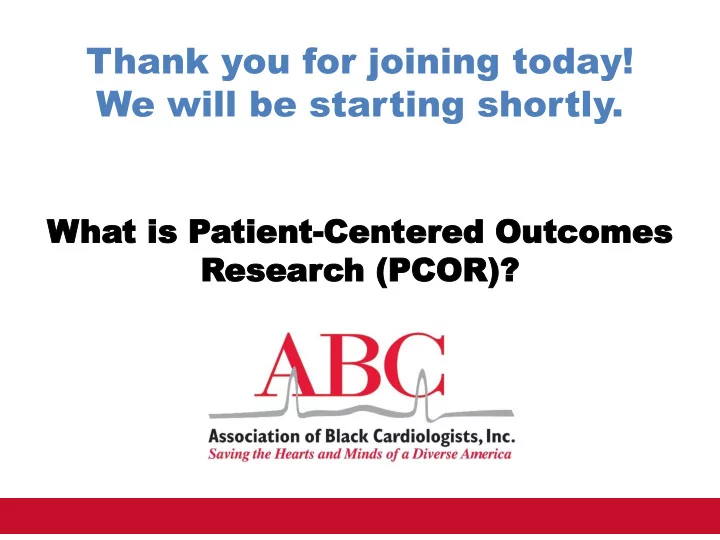

Thank you for joining today! We will be starting shortly. Wha hat t is is Patient tient-Cent Center ered ed Outco Outcomes mes Resea esearch (PCOR)? h (PCOR)?
Questions? You can ask questions by talking, or clicking on the “chat” button on the join.me app -Click the Chat button. How can I be part of a research -Enter your message team? and send. 2
Welcome to: Wha hat is P t is Patient tient- Cente Centered Outcom ed Outcomes es Resear esearch (PCOR)? h (PCOR)? Eldrin Lewis, MD, MPH
Disclaimer Acknowledgment: This presentation was based on work completed under contract number 8275-UMB funded by the Patient-Centered Outcomes Research Institute (PCORI). • The views expressed in this presentation are solely those of the speakers and do not necessarily represent the views of the Patient-Centered Outcomes Research Institute (PCORI), its Board of Governors, or Methodology Committee. 4
The Patient Voice Clarence Ancar Sharon Bond Member of the Member of the Stakeholder Advisory Board Stakeholder Advisory Board
Thank you to our Advisors! Patient Advisors Healthcare Advisors Clarence Ancar Philip Duncan Sharon Bond Daphne Ferdinand Florence Goodwyn Roosevelt Gilliam Scott Johnson Eldrin Lewis (Chair) Rhonda Monroe Jeanne Regnante 6
What is research? vs. What is Patient tient-cen cente tered d research? Eldrin Lewis, MD, MPH
What is research? • Gathering information to find answers to questions • In health care, research is designed to discover new information or better understand how to care for people. 8
What is Patient-centered Research? • Patient’s health care questions and desired needs (e.g., health outcomes) inform and drive the research agenda • Patients are part of the research team – Patients co-develop the research plan as part of the research team • Focus on research that is meaningful and health outcomes that matter to patients 9
Training on Patient-Centered Outcomes Research (PCOR) Funding from: Patient-Centered Outcomes Research Institute (PCORI) Project Title: PCOR Training for ABC Practitioners and their Patients
Goal of Training • By providing training about patient- centered outcomes research (PCOR) to people with heart conditions and their doctors, we hope to increase patient engagement in heart health research. 11
Why? & How? Why: Patients with heart conditions will help guide research so that it is most responsive to their concerns, needs and goals. How: Participate in research 12
How to participate in Patient-Centered Outcomes Research (PCOR)? C. Daniel Mullins, PhD
Levels of Engagement Active o Stakeholder-Directed • Patient/Patient group led o Partnership • Investigator/Co-investigator o Collaboration • Advisory committee member o Consultation • Consultant • Interviews Stakeholder- • Focus groups Directed • Surveys o Informal • Unstructured discussions o Study participant Collaboration Passive Consultation Study participant Adapted from Forsythe, et al. JGIM, 2015 & Perfetto, ISPOR 2015 Annual Meeting
Patient Engagement • Patient engagement at every step of research • Patient engagement is a continuous process • It requires trust & respect • Patient engagement happens even before the research study begins • Patient engagement should involve diverse people, their families and caregivers 15
Improving the care of people with high blood pressure Catherine E. Cooke, PharmD
High blood pressure ~ 1 out of every 2 people has high blood pressure 75% of people with high blood pressure take blood pressure medicine Only ~50% achieves the right level of blood pressure Sources: 2017 ACC/AHA Hypertension Guideline. JACC May 2018, 71 (19) e127-e248; DOI: 10.1016/j.jacc.2017.11.00; https://healthmetrics.heart.org/rends-prevalence-hypertension-awareness-treatment-control-us-adults-nhanes-2001-2016/
Patient-Centered Research Study Who is on the research team? What are the needs of the patients, caregivers PLANNING the Study or family members? What is the research question? Finding people to participate CONDUCTING the Study Collecting data Reporting the results What do the results mean? DELIVERING Solutions How can health be improved? 18 Vandigo J, et al. Expert Rev Pharmacoecon Outcomes Res. 2016;16(2):193-8.
High blood pressure research study PLANNING the Study • The research team – People with high blood pressure – Doctors, nurses and pharmacists – Researchers • Problem: You keep “giving me more pills” • Research question – How should blood pressure medicines be started and changed to decrease the chance of a heart attack or a stroke? 19
CONDUCTING the Study • Finding people to participate in the research study – Recruit patients from health fairs, doctors’ offices, and pharmacies • Collecting data – Ask patients questions over the phone • Reporting the results Changing blood pressure medications – “I would not want to change my pill. I would want to stay on that pill and if they have to, just up the dosage.” – “I would be so upset. I barely want to take the one I take.” 20
DELIVERING Solutions • What do the results mean? – There are different ways that doctors can change your blood pressure medicines to get your blood pressure under good control. This study found that people with high blood pressure would rather have the dose of their medicine increased instead of having to add another medicine. • How can health be improved? – Some pills contain more than one medicine, so if a person needs to take two medicines, then their doctors can give them one pill with both medicines in it. 21
How to develop trust with the research team? Eldrin Lewis, MD, MPH
Lessons Learned 1) Trust is the key, overarching element for PCOR 2) Patient vs. person 3) “Outcome” is an unfamiliar term 4) Research is an abstract concept for many people 5) Researchers need to communicate in a way that is understandable for people who haven’t had much experience in research 6) People do not like being asked repeated questions 7) Community-based PCOR requires flexibility, compromise and time 8) Researchers should give something back to the community 23
Questions 24
Please complete the evaluation form: http://bit.ly/PCORTraining Thank you for participating!
Recommend
More recommend